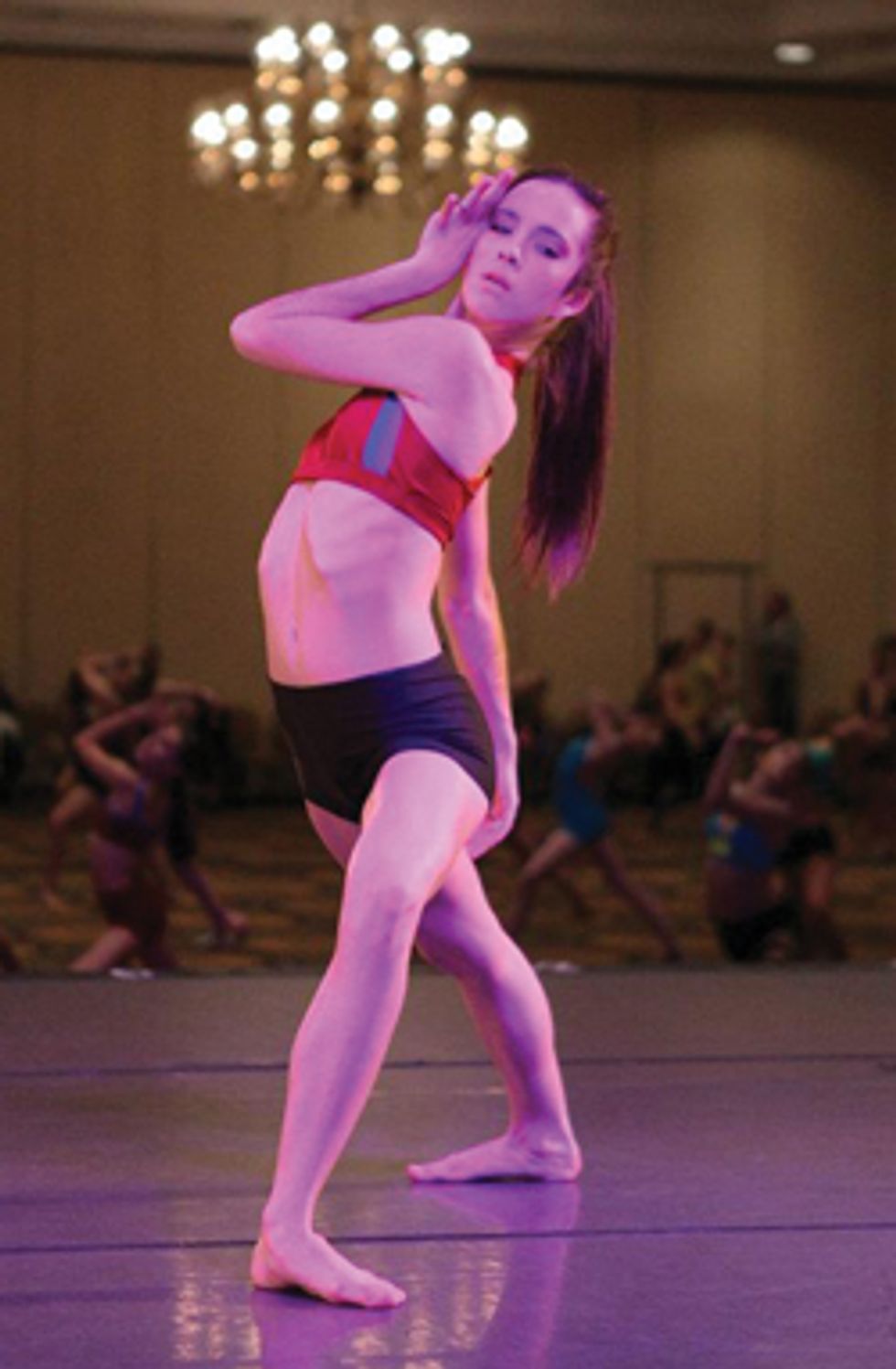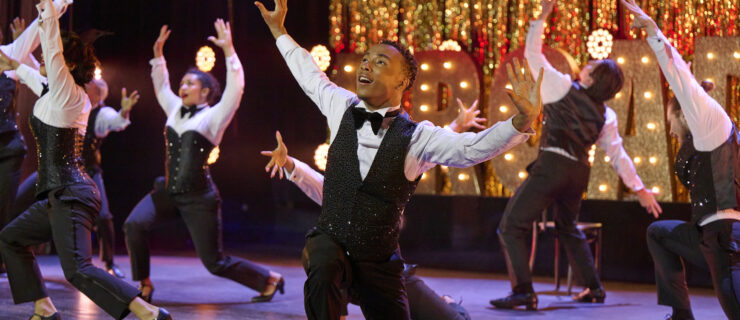A Tale of Many Cities

Madi Hicks demonstrates onstage during a convention class. (ProPix)
You’ve seen it before: That girl standing front and center in the convention ballroom, who seems to pick up the choreography without even thinking about it. She executes each combination perfectly the first time the music plays. The faculty members know her by name. How can this be? Well, it’s her fourth city with the convention this season.
Traveling to multiple cities to attend the same convention is an increasingly popular trend. But why? And is it beneficial? We talked to some of the industry’s leading competition and convention veterans to learn more.
Go For the Right Reasons
Before deciding to attend the same convention in several cities, ask yourself what your motive is. Are you chasing a specific scholarship in hopes of winning a top title at Nationals? If so, you may want to rethink your approach. Lauren Adams, a long-time convention teacher and faculty member at the new convention 24 Seven, doesn’t feel traveling to multiple conventions will help you win a national title. “If it takes you five tries in different cities to win the regional title, you’re probably not going to win at Nationals,” Adams says. “If I see a dancer in a couple of cities, I may be more likely to call her up onstage, but what I see in front of me that specific weekend is what I’m focused on.” Christy Wolverton, owner of Dance Industry Performing Arts Center in Plano, TX, agrees: “If a dancer doesn’t win the title the first two times, she probably isn’t ready for it. There’s something missing, and she needs to figure out what it is by getting back in the studio and getting to work.”
In 2011, Madi Hicks won New York City Dance Alliance’s National Teen Outstanding Dancer title having only attended one regional NYCDA convention in her hometown of Dallas, TX. “I really wanted to make the Top 10 at Nationals, but I didn’t have the time or money to travel to other cities,” Madi says. “I worked my butt off all year in the studio and was shocked when I won, because I knew that other girls had been to several cities.” After winning, Madi spent the following regional season touring with the convention across the country. While she admits to seeing the same dancers in many of the cities she assisted, she says a lot of the dancers do it for reasons beyond winning scholarships. “Dancers care about their art and improving themselves,” Madi says. “If you’re going to every city, you need to do your best to grow—and not be worried about getting pulled up onstage or winning scholarships.”

Dancers show off their moves at The PULSE On Tour.
Opportunities Await
It’s true that there are a lot of benefits to attending various cities in one season—beyond scholarships and titles. “You’ll have more opportunities to make connections and establish relationships with artists early on,” Adams says. “Conventions are a great pool for faculty to pull from when they need dancers.”
Adams also feels they’re a great place to be inspired. “Each weekend you can dance with and learn from a different group of talented people,” she says. Adds Madi: “The dancers are so different in each city—they inspire me and make me grow. If I see someone who’s especially amazing in jazz or ballet, I want to take what they have and use it to become better.”
According to Adams, traveling to multiple cities is a great way for dancers to prepare for the professional dance world, even if they’re learning the same combination in every city. “Each weekend dancers are exposed to a lot of material,” Adams says. “Sometimes we’re quick to want new combos instead of investigating and working through the material we’re given. But in a professional setting, you’re often working with the same choreography for months.”
Consider the Consequences

Ida Saki won NYCDA’s National Outstanding Dancer title in 2009 after attending just one regional competition. (ProPix)
While Gil Stroming, owner of Break the Floor Productions (the parent company of JUMP, NUVO and The Dance Awards), agrees that traveling to several cities will help teachers get to know you better, he feels the time spent in your studio back home is crucial. “I don’t encourage dancers to come to more than two cities each season,” he says. “I’m a firm believer that good, consistent training at your studio is more important than convention hopping.” He’s seen many dancers leave their studios—or spend less time there—because they feel conventions are better training. “In my experience, the dancers who leave the studio that made them great tend to end up worse off,” Stroming says. Wolverton, too, warns of the effect this trend can have on your overall training. “Dancers need to take class from as many people as possible, and conventions are inspirational in that way,” she says. “But you still need a home studio you can come back to for your everyday training—especially ballet classes during the week.”
If a heavy travel schedule is something you’re considering, you also need to sit down with your parents and decide if it’s a financially smart decision. Convention registration fees alone run up to $250, and that doesn’t include competition fees, hotel costs, transportation or food. Wolverton feels the money could be better distributed. “Go to a good summer program, or travel to L.A. or NYC to take classes,” she says.
It’s also important to take into account the emotional and physical stress traveling and dancing all weekend, every weekend, can put on your body. “You have to realize how exhausting it can get,” says Madi, who attends Booker T. Washington High School for the Performing and Visual Arts during the week. “When I first started touring with NYCDA, I thought I wanted to go to every city, but if you’re in school and dancing at a studio, it can be tough.” It’s been a give-and-take situation for Madi. Because she was away from home most weekends, she was unable to dance in some of her school’s showcases and didn’t get to perform in The Nutcracker with her studio this year. But she says it’s been worth it and plans to continue to frequent the convention scene in the coming season. “I want to be in my school’s repertoire company, and I would like to compete,” she says. “But my main focus will be going to multiple conventions—a lot of NYCDA cities, NUVO, JUMP and other conventions. I want to take from new teachers.”
In the end, the decision to attend multiple cities with a single convention is one only you and your family can make. Conventions are a great opportunity to train with working professionals, but you have to choose the kind of role you want them to play in your training.




